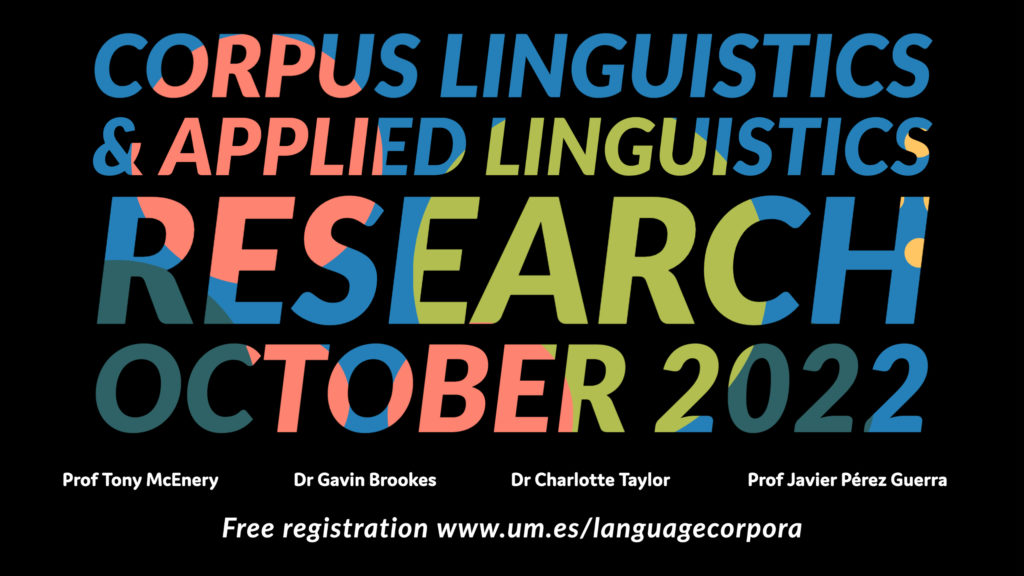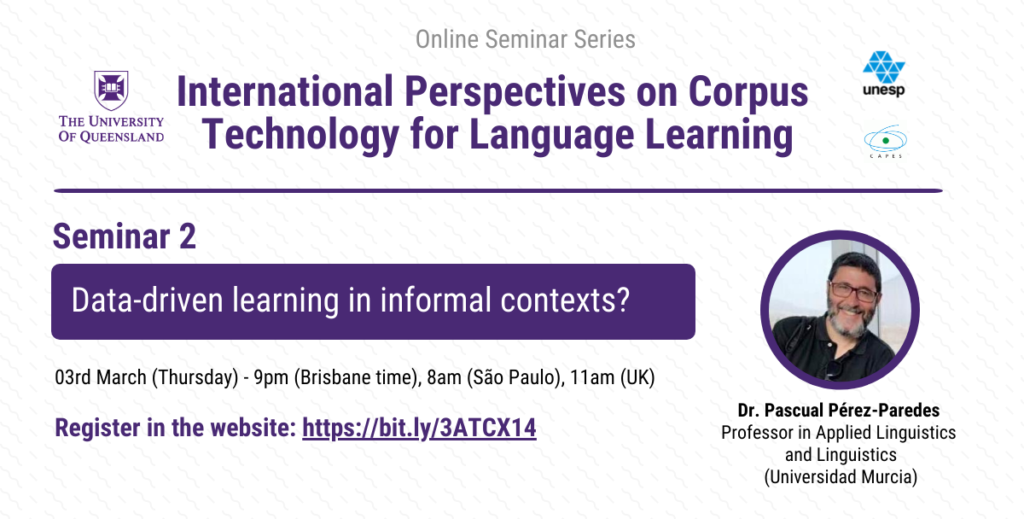Category: applied linguistics
Free online event “Corpus & applied linguistics research 2022”

–Corpus linguistics and Second Language Acquisition
Prof Tony McEnery, University of Lancaster
October 5, 18:00 (Madrid time) / 17:00 (UK time)
–Who’s in this corpus? Looking at language and identity with (and without) demographic metadata
Dr Gavin Brookes, University of Lancaster
October 12, 18:00 (Madrid time) / 17:00 (UK time)
–Corpus linguistics and the discursive construction of migrants
Dr Charlotte Taylor, University of Sussex
October 19, 18:00 (Madrid time) / 17:00 (UK time)
–A corpus-friendly analysis of fragmentary constructions in English
Prof Javier Pérez Guerra, Universidad de Vigo
October 26, 18:00 (Madrid time) / 17:00 (UK time)
Free event registration link

After the registration, you’ll receive an email with the webinar link for the four talks. This is the same link for all four talks.
You can check out the 2021 talks here:
https://www.youtube.com/channel/UCKjKIIQL6u1mXD2V9ZaT-_Q/featured
This online event is organized by the Universidad de Murcia and the E020-07 research group (Lenguajes de especialidad, corpus lingüísticos y lingüística inglesa aplicada a la ingeniería del conocimiento).
Coordination: Prof Pascual Pérez-Paredes
Corpus linguistics methods in education research
Prof Pascual Pérez-Paredes
Using #corpuslinguistics methods in education research @EducationBATH seminar series.
25 May 2022 Thanks to @SamanthaCurle @rjreka U. Bath, Uk
Some interesting new research on corpora, technology and language learning
Curry, N. (2022). On Corpus-Based Contrastive Linguistics and Language Pedagogy: Reimagining Applications for Contemporary English Language Teaching. In: McCallum, L. (eds) English Language Teaching. English Language Teaching: Theory, Research and Pedagogy. Springer, Singapore. https://doi.org/10.1007/978-981-19-2152-0_14
Li, L. X. (2022). Meta-Analytical Approach to the Impact of Corpus-Driven Teaching on Foreign Language Acquisition. Mobile Information Systems, 2022. https://doi.org/10.1155/2022/5049312
Ng, C.H., Cheung, Y.L. (2022). Teaching and Learning English in the European Union: A Research Review. In: McCallum, L. (eds) English Language Teaching. English Language Teaching: Theory, Research and Pedagogy. Springer, Singapore. https://doi.org/10.1007/978-981-19-2152-0_2
Nishigaki, C., Akasegawa, S., & Oghigian, K.(2022). Development of an Online DDL Tool for Secondary School Learners. 千葉大学教育学部研究紀要, 70, 289-297. https://opac.ll.chiba-u.jp/da/curator/900120471/S13482084-70-P289.pdf
Tafazoli, D. (2022). English Language Teachers’ Attitudes Towards Computer-Assisted Language Learning: SWOT Analysis in Spain. In: McCallum, L. (eds) English Language Teaching. English Language Teaching: Theory, Research and Pedagogy. Springer, Singapore. https://doi.org/10.1007/978-981-19-2152-0_16
Yasaman Iravi & Ali Malmir (2022) The effect of lexical tools and applications on L2 vocabulary learning: a case of English academic core words, Innovation in Language Learning and Teaching, DOI: 10.1080/17501229.2022.2102638
Data-driven learning in informal contexts?
Phil Durrant’s talk available on Youtube
Check out Dr Durrant’s talk “Researching writing development with a corpus” on our research group Youtube Channel https://www.youtube.com/channel/UCKjKIIQL6u1mXD2V9ZaT-_Q
More info on the talk here.
More info on Corpus linguistics and applied linguistics research 2021 site.
